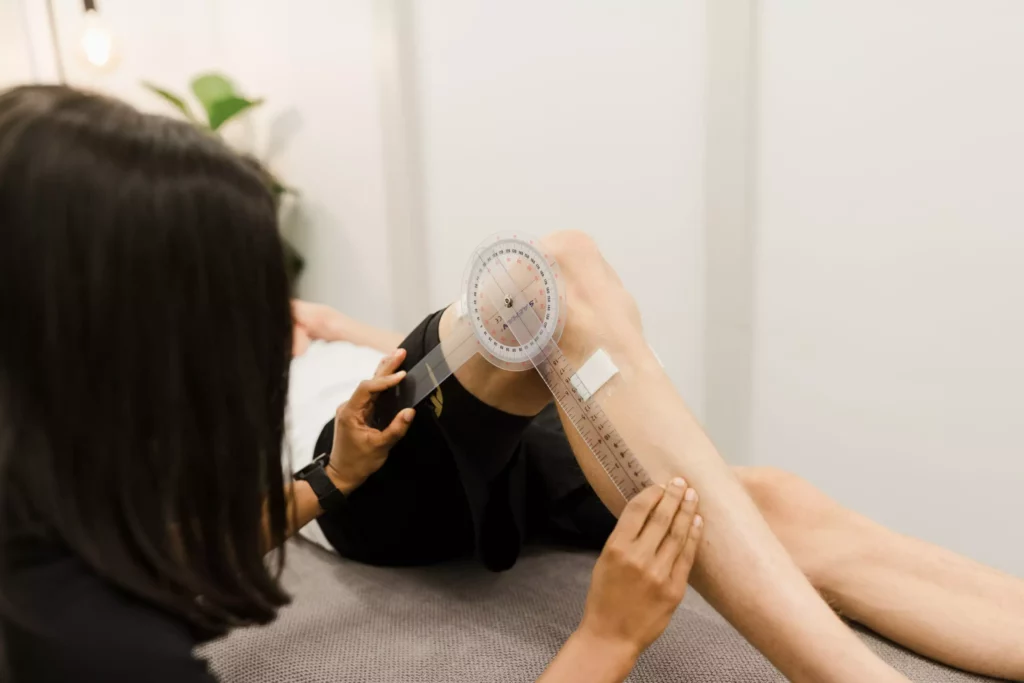Photo by Dominic Kieler on Preoperative rehab knee .
Preparing for surgery often focuses on the procedure itself; however, what you do beforehand can significantly affect recovery. Pre-surgery physiotherapy, or prehabilitation, is a vital step to optimise outcomes, speed up recovery, and reduce complications. Here are 5 aspects of how it can improve your surgical experience:
1. Strengthening Muscles and Enhancing Flexibility
Pre-surgery physiotherapy strengthens muscles and improves flexibility around the injured area. For joint surgeries like hip or knee replacements, stronger muscles help reduce post-operative pain and aid in quicker recovery.
2. Improving Joint Mobility
For surgeries involving joints, exercises to improve range of motion can reduce stiffness and discomfort, making post-surgical rehabilitation smoother.
3. Reducing Pain and Inflammation
Physiotherapy techniques like massage, ice, or heat therapy help reduce chronic pain and inflammation before surgery, minimising swelling and discomfort after the procedure.
4. Mental and Emotional Preparation
Prehabilitation also addresses the mental aspect of preparing for surgery. It reduces anxiety and helps patients feel more prepared for the recovery process through education and support.
5. Boosting Cardiovascular Health
Cardiovascular conditioning improves stamina and circulation, reducing the risk of complications like blood clots and pneumonia while promoting faster healing.
Specific Benefits of Pre-Surgery Physiotherapy
- Faster Recovery: Research from Cortellazzi et al., (2017)1 shows that patients who undergo prehabilitation recover more quickly than those who don’t. This is especially true for joint surgeries, where pre-surgery exercise programs improve mobility and reduce post-operative complications.
- Fewer Complications: Pre-surgery physiotherapy can reduce the risk of complications such as infections, blood clots, and prolonged hospital stays. By strengthening muscles and improving flexibility, patients are less likely to experience joint stiffness or muscle atrophy (reduction of size) after surgery.
- Reduced Post-Operative Pain: Building strength and improving range of motion before surgery can reduce pain after surgery, helping patients move more easily and begin rehabilitation sooner.
- Increased Confidence: Knowing that you are physically prepared for surgery can reduce anxiety and boost confidence. This positive outlook often translates into better recovery outcomes.
**Most of our Shailer Park Physiotherapists have a special interest in Pre-Surgery Physiotherapy, check out their profiles here! (Allen Park, Aryan Hebbandi)**
How Pre-Surgery Physiotherapy Works
The process typically begins with an initial assessment by a physiotherapist, who will evaluate your strength, flexibility, and joint function. Based on this assessment, a customised prehabilitation program is designed, which may include strengthening exercises, stretching routines, and manual therapy. In addition, patients are educated on pain management, proper posture, and movement techniques to prepare for post-surgical rehabilitation.
Ready to Optimise Your Recovery?
If you’re preparing for surgery and want to ensure the best possible outcome, pre-surgery physiotherapy can make all the difference. Our expert physiotherapists in Shailer Park are here to help you build strength, improve mobility, and reduce pain before your procedure, setting you up for a smoother, faster recovery. Don’t wait until after surgery—take action now to optimise your recovery from the start.
Contact us today at 07 3132 0898 to start your rehabilitation journey.
We’re here to support you every step of the way!
References
- Cortellazzi, C. A., Abreu, M. F. R., & Almeida, A. M. (2017). Effects of preoperative physiotherapy on patients undergoing total knee replacement surgery: A systematic review. Journal of Orthopaedic & Sports Physical Therapy, 47(5), 323-333. https://doi.org/10.2519/jospt.2017.7375 ↩︎
Iglseder, B., Marksteiner, R., & Moser, C. (2017). Cardiovascular conditioning in preoperative physiotherapy: A review of its effects on recovery after major surgery. European Journal of Preventive Cardiology, 24(2), 219-227. https://doi.org/10.1177/2047487316683375
Naylor, J. M., Campbell, S., & Reeve, J. (2020). Prehabilitation and rehabilitation for hip and knee replacement surgery: A systematic review. Cochrane Database of Systematic Reviews, 5, CD012862. https://doi.org/10.1002/14651858.CD012862.pub2
Penny, C., Goggins, J., & Clarke, A. (2018). The impact of preoperative physiotherapy on pain and functional outcomes in orthopedic patients: A systematic review. Musculoskeletal Care, 16(1), 25-35. https://doi.org/10.1002/msc.1262
Thomas, E., John, S., & Green, D. (2021). Psychological benefits of prehabilitation in patients undergoing orthopedic surgery. Journal of Clinical Psychology in Medical Settings, 28(2), 234-242. https://doi.org/10.1007/s10880-021-09735-2
Check our Previous Blogs
- Why Movements Matter for hypermobile Ehlers-Danlos Syndrome, and Hypermobility Spectrum Disorder
- Understanding Whiplash: Your First Steps to Recovery
- Runner’s Knee Explained: Causes, Symptoms & 7 Treatments
- Shin Splints No More: 6 Proven Ways to Prevent and Treat the Pain
- Stop Tennis Elbow for Good: 5 Proven Treatments That Work


